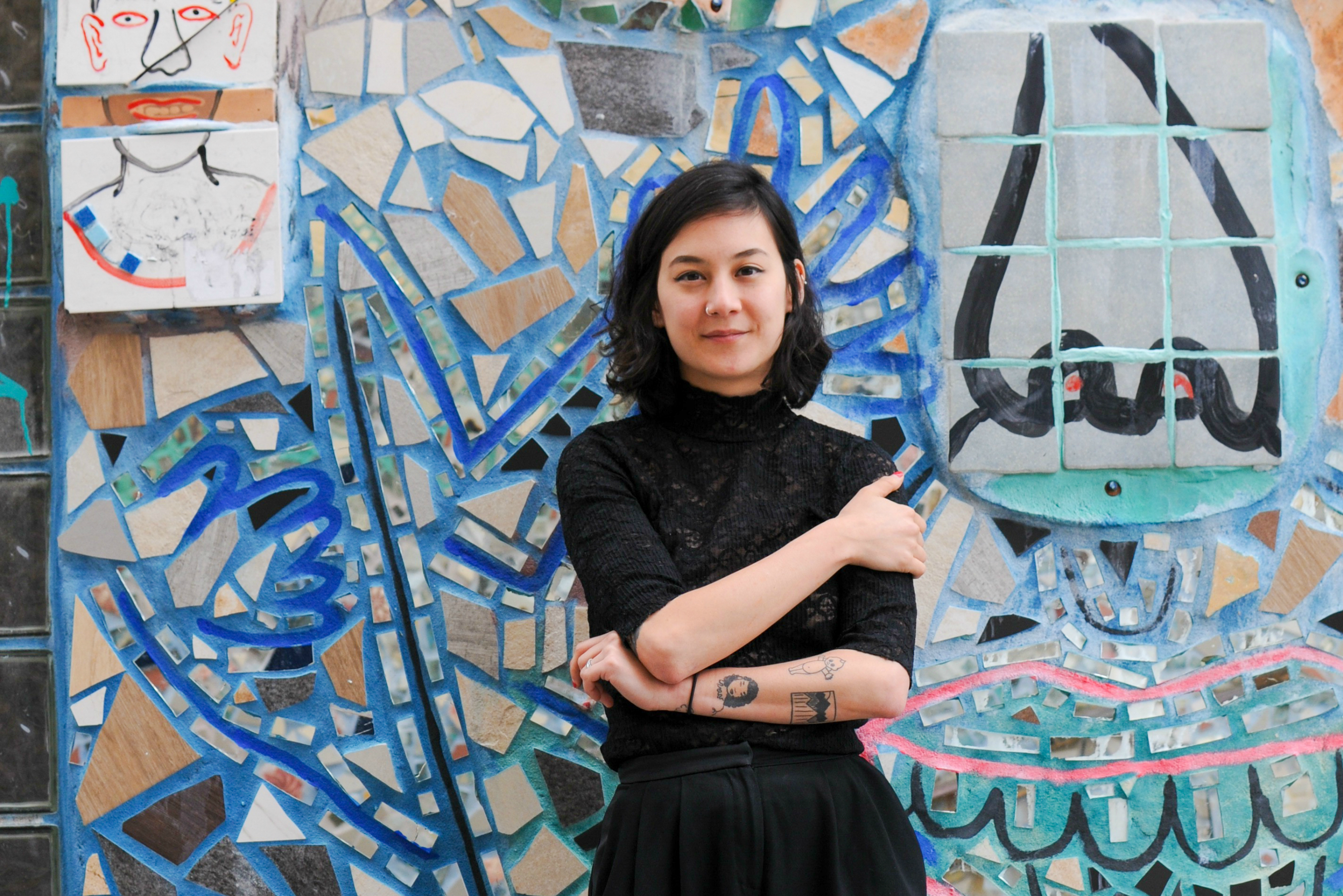The Japanese Breakfast studio, which Michelle Zauner inherited from War on Drugs bassist Dave Hartley, is behind a locked, unmarked door in an industrial neighborhood in Philadelphia. The stairs reek like a rat died in the wall. The ambience is what you might call basement rustic.
This is where Zauner recorded her sleek new album as Japanese Breakfast, Soft Sounds From Another Planet. When we meet on a gray afternoon in May, Zauner has just returned from gigs in London and Paris, where she opened for Slowdive. She’s tired, but bright and spritely, with little patience for indecision. “I’m an Aries,” she says. The jet lag is nothing, she adds, compared to a trip to Korea.
Zauner’s mother was from Korea, and the singer still marks time in months since her death. The event became the defining moment of Zauner’s still-young solo career, an ache inscribed into the most poignant tracks of her dense, dreamy 2016 debut, Psychopomp. The album cover features her mother’s photo, reaching out to a world she can’t quite touch. “Psychopomp was written like two months after my mom had passed away, and this was a year and a half after,” Zauner says of the new record. “To ban myself from writing about that experience felt really phony.”
Planet picks up where Psychopomp left off; some of its songs are older, reimagined from Japanese Breakfast tape demos or songs Zauner wrote with her previous band Little Big League. Eventually, the subject matter comes back to healing: from the pain and anger and grief, along with the “robotic” state of mind she adopted to survive it. “I would see some forty-year-old woman with her eighty-year-old mom, and I would just get pissed off,” she says. “It would make me so angry that someone gets to have their mom for all of that time and I don’t. I just was so angry at everyone and the world, and a lot of this album is about trying to undo those feelings.”
If you—a Parisian Slowdive fan, perhaps—were to stumble into a Japanese Breakfast show, you’d be forgiven for not guessing the depth of heartbreak behind Zauner’s music. On stage, she’ll dance, pogo hop, or leap atop a monitor to give her five-foot-two frame some additional clearance. Her natural charisma can magnetize a room. “I know she’s been around for a while, but I think she’s very much at the start and on the cusp of something really big with her band,” says Slowdive’s Rachel Goswell over the phone from the U.K. “She’s just got something about her that’s really special, I think. I don’t often see that. It’s quite a rare thing, but whatever it is, I think she has it.”
When we meet, Zauner is about to leave for almost six months of gigs: first with fellow indie darling (Sandy) Alex G, then a few dates with Tegan & Sara, and finally her own inaugural headlining tour. For the first time, her husband Peter Bradley will accompany her as Japanese Breakfast’s guitarist. Until then, he’s in the back of the studio assembling shelves for their burgeoning stock of band merch. “I went from ordering 300 shirts at a time to like, 1,000,” Zauner says, as our interview is interrupted yet again by the crash of metal on cement. She used to write thank-you notes in every order, but these days there’s just not enough time.
[featuredStoryParallax id=”252595″ thumb=”https://static.spin.com/files/2017/08/japanese-breakfast-peter-and-michelle-1502123549-300×199.jpg”]
A few years ago, Zauner might have felt lucky to sell a shirt. Little Big League released two albums of weathered, shoegaze-inflected punk on noted emo revival labels Tiny Engines and Run for Cover, but they were small time. “I had been touring for five years, DIY style, which is really shitty and hard,” she says. “Driving for long hours, and not getting paid, and you know, houses where some drunk dude is passing a can around and people are putting cigarette butts and cans of soup in it, and maybe like twenty dollars that you’re supposed to split with three other people. It’s just not sustainable.”
Little Big League began to dissolve when bassist Deven Craige was offered a spot in a band who’d signed to Dead Oceans, the Bloomington, Indiana-based indie heavyweight. “I’m really sorry, but this is my goal,” Zauner remembers him saying. “They’re gonna be Jimmy Fallon big”—popular enough to play late-night TV. Zauner was crushed. “I felt like I wasn’t talented enough to be on that same level, to provide that for my bandmates,” she says. “My songs weren’t good enough to reach a certain market that would offer us a professional career.” Not long after, her mother was diagnosed with cancer. Zauner moved home to Oregon to be with her parents. She was still writing songs, but her band was effectively over.
***
“I feel like I’m dying really soon so I just have to get all my work out there!” Zauner exclaims. Her mother and her aunt died of gastrointestinal cancers. She fears the same fate awaits her, though that hasn’t stopped her brain from worrying about every other kind of accident and disaster in the meantime. “PTSD, anxiety, genetic disease, thanatophobia,” she sings on Planet’s “Till Death.” She’s only 28, but life feels short. This March, she had to put down her family’s aging golden retriever, Julia, the one who sniffed around her mother’s empty room in the opening lines of Psychopomp.
After her mother’s death, Zauner couldn’t go back to the tenuous existence of the full-time DIY musician. “I just wanted to work a job, from 9 to 5, and make as much money as possible, and have benefits,” she says. “I needed health insurance.” She and Bradley moved to Brooklyn, where Zauner found work at an outdoor mural advertising company. At 5:30 every afternoon, she’d hustle to the studio to mix Psychopomp, the record she’d started writing in Oregon. She had no plans of going back on the road, so she found a tiny independent label, Yellow K, who were willing to release the album and didn’t expect a tour.
Nine months into the advertising gig, Zauner was let go. The mural company offered her $4,000 severance. “That was right around the time when the first track came out, and we had one SXSW show turn into eight,” she says from her perch in the studio’s computer chair. Later she adds: “We got tracks written up at a number of blogs, and people really responded to it. The first review went up on Pitchfork, and the next day I got so many emails from different labels being like, ‘Can we talk?’ One of them was Dead Oceans. It was like, ‘Huh?! Oh my God, this label that took my friend away, and now it’s my time!’”
[featuredStoryParallax id=”252596″ thumb=”https://static.spin.com/files/2017/08/japanese-breakfast-michlle-guitars-1502123659-300×199.jpg”]
Dead Oceans re-released Psychopomp last September. Over the next three months, Zauner and co-producer Craig Hendrix completed Planet, playing every instrument except for saxophone and trumpet. So confident was Zauner in her mandate that she refused to let the label hear any music until the album was finished. “I wanted there to be a seamless line between the recording process and the production process and the composition process,” she says. “We weren’t having to pay a day rate or anything, and we could just work and work and work until we felt like it was done.”
Japanese Breakfast doesn’t sound much like Little Big League. If there is a holdover, it’s a tendency toward shoegazing, the soothing spiral of guitars that make a Planet song like “Body Is a Blade” feel far more expansive than its three and a half minutes. Then there’s Zauner’s voice. Expressive enough for emo and wistful enough for dream pop, she sounds more at home on Planet than ever before. Consider “Boyish,” which first appeared on Little Big League’s 2014 album Tropical Jinx as a murky alt-rock jam. On Planet, it’s reborn as something Zauner calls a “Phil Spektor-y Roy Orbison ballad.”
“I remember being surprised by how different her solo music was from other stuff I’d heard from bands she was in,” Mitski tells me. “Her solo music was much poppier, softer than the punky stuff I’d heard from her bands, and her solo music was more relatable to me.”
Japanese Breakfast is often grouped with Mitski, her Dead Oceans labelmate; they toured together in 2016 with Jay Som, a remarkable coalition of rising indie acts all fronted by Asian-American women. “In the greenroom backstage at our Oakland show, I was really sick and so I was just sort of sitting around, drinking tea, dazed,” Mitski remembers. “We got to talking, and she told me about how she said goodbye to her mother, how she felt about it, and I remember just starting to cry because it was all so sad and sincere, and how she dealt with it was so beautiful.” The affection is mutual, though one imagines they’re growing weary of the professional comparison.
***
Leaving the studio, we head to Upper Darby, a town on the western outskirts of Philadelphia. Our destination is H Mart, a Korean grocery store and accompanying mini-mall with hair salons, furniture shops, a mom-and-pop version of The Sharper Image, and a food court. Zauner orders lunch in Korean. “My accent is good,” she says. Her strength is food vocabulary, but she’d like to be fluent, to live in Korea for a year and become a panelist on a talk show. In addition to moving abroad, she’s thinking about withdrawing to a remote woodland studio like Mount Eerie’s Phil Elverum, or starting a Korean food truck, or opening a sit-down restaurant.
Zauner constantly bursts with ideas. Ever since she won an essay-writing contest in Glamour last year, she’s been plotting her first food memoir. It’ll be about teaching herself Korean cooking, and the happy, pre-cancer memories she was able to unlock when she began studying her mother’s native language and cuisine. Her greatest professional regret so far, she says, was having to decline an invitation to perform for her hero, the Korean cooking YouTuber Maangchi. “Have you seen that movie Julie & Julia?” she asks. “She was my Julia Child—just really, really reconnected me to my heritage. For a while, I only had bad memories of my mom, when she was sick, and cooking Korean food, for me, was really helpful to remember nice times I had with my mom.”
[featuredStoryParallax id=”252601″ thumb=”https://static.spin.com/files/2017/08/japanese-breakfast-octopus-tank-1502124499-300×199.jpg”]
At H Mart, we wander the aisles, looking at frozen seafood cases, stacks of house slippers, cookware sets the colors of Jordan almonds. Zauner mugs for photos with the lobster tank and picks up ingredients for dinner: barbecue pork, frozen dumplings, rice and lettuce for wraps.
Soft Sounds From Another Planet started as dinner plans, a dream of an eight-course murder mystery party set in outer space. A friend gave Zauner a gift card to sample a professional dinner theater first, but Japanese Breakfast’s tour schedule left little time for date nights. Unable to make concrete plans, she ruminated on the theme, realizing how many of her childhood favorites were science fiction: The Fifth Element, Waterworld, Dune, “and lots of anime, like Cowboy Bebop.” Another friend had received a rejection letter from Mars One, the space colonization project. The concept fascinated her.
She arrived at the album’s first finished song: “Machinist,” a groovy chillwave “Young Americans” with a fanciful spoken introduction. Her original plan for the album was nearly as complicated as the dinner party. Zauner briefly envisioned a full-length space opera about a woman who travels to Mars to escape star-crossed love with a robot. Little of it made the final cut, but in her “Machinist” video, Zauner is alone on a spaceship, attempting to build her lover a mechanical body. It is, in a way, a story about transcending human pain.
***
After groceries, we head to the apartment she shares with Bradley in Philly’s Washington Square neighborhood. There’s a pile of Amazon boxes waiting outside, miscellaneous things they’ve ordered in preparation for the upcoming tours. “The nicest place I have ever lived,” Zauner says as we walk upstairs.
It’s a one-bedroom on the second floor, cozy and lived-in, even though its occupants aren’t home much. Her first three albums —two with Little Big League and then Psychopomp—are framed beside the bookcases in the front hall. Propped up against the empty fireplace is the Leverkuhn, Bradley’s homemade synthesizer game. It’s a glass-topped box with silver volume knobs, circuits boards, and a checkered playing surface, as if Scrabble only went up to G. The object of the game is to allow two people to compose a song together. He’s almost ready to start building his second prototype.
Before her mother’s illness, Zauner didn’t picture herself married. In real life, she and Bradley planned a whirlwind wedding so her mom could be there. She doesn’t regret it. “There was this thing that my mom used to say whenever I had a stomach ache, like, ‘Love is like wanting to physically take someone’s pain away from them,’” she says. “It must have been hard for Peter, too, watching me go through all this stuff that I went through, and not being able to do anything about it but to just physically be by my side.” The hardest part of Japanese Breakfast’s past tours, Zauner says, was being separated. “Now that he’s coming, I feel like I could just tour forever.”
Former Little Big League bassist Deven Craige is coming too; when things didn’t work out with the other band, Zauner welcomed him back. For the first time, Japanese Breakfast appears to offer a sustainable future—a means of self-employment not dependant on the charity of strangers at house shows. Plenty of brilliant musicians blanch at the sight of a spreadsheet. Zauner builds them. Still, she’s not about to let modest financial realities dampen her artistic aspirations. She’s prepared a video treatment for “Boyish,” she says, far beyond any indie label’s production budget. She plans to work on the food memoir on the road, if she can find the time.
If you want to imagine where Japanese Breakfast might go, look no further than “Diving Woman,” the opening track on Soft Sounds From Another Planet. It’s her longest song yet, marrying a Korean image—haenyeo, the disciplined female free-divers of Jeju Island—with the emotions and daydreams of Zauner’s own life. “When I get back there, baby, gonna make you a home,” she pleas, a line she says was inspired by her past loneliness on tour. In its steadiness and comfort, “Diving Woman” feels almost oceanic.
“We don’t really find a lot of meaning in day-to-day moneymaking,” Zauner says of herself and Bradley. “We’re not really politically active beyond the normal stuff. I think that both of us seem to believe our imprint in the world is by making things.”





